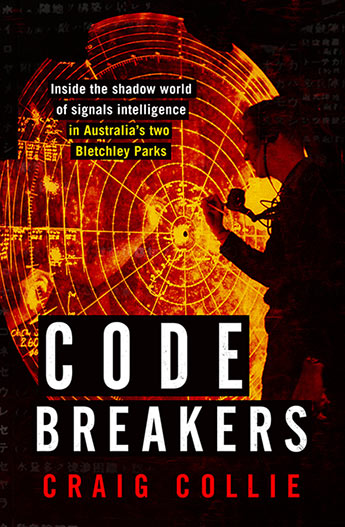Despite the fame of Britain’s Bletchley Park for code cracking there were many unsung installations around the world that carried out important signals intelligence work with spectacular results. In this interesting history Collie concentrates on two Australian groups and their place within the rapidly evolving international intelligence scene. He peppers the book with descriptions of the growing cast of eccentric characters and the work they did.

Signals intelligence was new discipline at the start of the war and like every new discipline got off to a shaky start. This was particularly so as it was trapped between the disciplines of communications and intelligence and the various organisations of army, navy, air force, diplomatic services of different countries. The early allied scene was a shambles not helped by signals intelligence operations being riven with internal jealousies as congenital introverts battled with organisational show pony’s and empire builders for control both of the methods and of the organisations.
Uptake of its products was hampered by the type of scepticism suffered by all new technology. Even as it began supplying good information it was ignored by operational commanders because that was simply not the way things were done. Everywhere around the Pacific the initial Japanese attacks at Pearl Harbour, the Philippines, Malaya and Singapore and Darwin were predicted by local operators but ignored by local higher command. These commanders then suffered ignominy and career failure after their neatly parked planes were destroyed on the ground, ships were sunk and installations neutralised. These oversights led to an increasing but grudging awareness that signals intelligence was both important and reliable.
As the Japanese advanced in the Pacific, there were dramatic evacuations of key signals intelligence groups back to safety. The danger and discomfort of the submarine evacuation of US groups from Corregidor to Freemantle are described in graphic detail. At the same time, Australian groups located to Melbourne and elsewhere around Australia and benefited by taking in professional refugees from British outposts.
As at Bletchley Park signals intelligence bases were peopled with eccentrics. Throughout Collie lightens the technical and political story with entertaining vignettes of the more extreme characters. Such characters as the cryptographer who wandered the dingy passages in slippers and dressing gowns while smoking his pipe or the young linguist who kept a pet gibbon nestled in his jacket. Everywhere the eclectic mix of eccentrics came up with their own systems of code cracking. And contrary to popular belief, it wasn’t only Bletchley Park that had machine assistance with deciphering code –US staff pressed IBM tabulators to speed up code sorting by five times.
With danger rapidly closing in on Australia the US Fleet Radio Unit Melbourne (FRUMEL) was born in Melbourne. Typically they viewed Australians as lesser mortals. Initial cooperation was slight. Meanwhile, despite the organisational chaos, real progress was being made in the various different locations in breaking Japanese codes, helped in large part by sloppy Japanese radio and coding practice.
The first big coup for signals intelligence came when the planned Japanese invasion of Port Moresby was detected by a combination of code breaking and fluctuations in radio traffic. This invasion was headed off in the Coral Sea enabling the first big military breakthrough of the war against the Japanese.
The next big success followed by anticipating an attack on the island of Midway. Signals intelligence was interpreted differently in America to that from Melbourne. US Admiral Nimitz ordered a signals test which involved sending a spurious signal and detecting the Japanese signals response. The test proved Melbourne right and he rushed his carriers to Midway to achieve another great strategic and tactical win.
Not long after, and to President Roosevelt’s extreme pleasure, Admiral Yamamoto’s travel plans in the Pacific were captured and decoded. His air transport was shot down with no survivors. This big catch resulted from a radio signal intercept by an Australian radio operator in Townsville, passed on to FRUMEL in Melbourne.
Despite the significance of such coups, day-to-day life was a grind for radio intercept personnel in fetid remote radio stations in the tropics and coders and linguists back at Melbourne. Through all the travails, signals intelligence proved their worth and played an increasingly decisive part in winning the war.
Through the book, Collie moves effortlessly between high level political machinations to the radio and desk signals and decryption personnel to the results – action in the field. This is a must read for people interested in the aspects of signals intelligence in the war against the Japanese.
Contact Brent D Taylor about this article.






